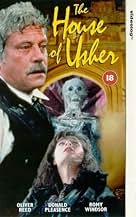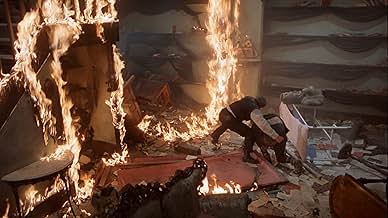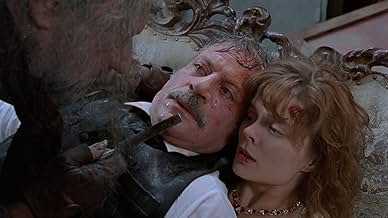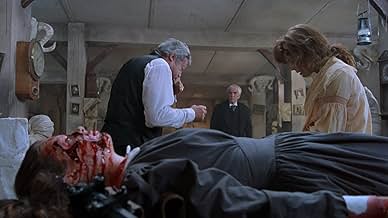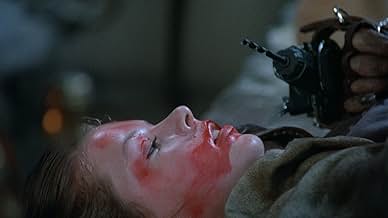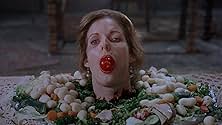Ajouter une intrigue dans votre langueAn engaged couple going to the man's uncle's house get into a car accident. The woman becomes trapped in the house with deranged residents and weird happenings.An engaged couple going to the man's uncle's house get into a car accident. The woman becomes trapped in the house with deranged residents and weird happenings.An engaged couple going to the man's uncle's house get into a car accident. The woman becomes trapped in the house with deranged residents and weird happenings.
Histoire
Le saviez-vous
- AnecdotesThe main title theme (which is also played several times throughout the movie) is actually the main title theme from Gary Chang's score for John Frankenheimer's film Paiement Cash (1986).
- ConnexionsFeatured in Svengoolie: The House of Usher (2000)
Commentaire en vedette
Soon-to-be-wed American couple Ryan (Rufus Swart) and Molly (Romy Windsor) travel to England to meet Ryan's uncle Roderick (Oliver Reed) at the family mansion, which is slowly sinking into a swamp. Whilst driving to the estate, the couple are shocked to see two ghostly kids standing in the middle of the road, and crash their car into a tree. Ryan is knocked unconscious, so Molly runs to the Usher home for help; convinced that an ambulance has been called for her injured fiancé, Molly rests, but ultimately finds herself a prisoner of Roderick, who wants the girl for himself, to carry his seed and continue his lineage.
Fancying himself as a bit of a Roger Corman, director Alan Birkinshaw tackled two Edgar Allen Poe adaptations in 1989, The Masque of the Red Death (which I have yet to see, but has a lousy rating), and what has to be the worst film ever to be inspired by The Fall of the House of Usher. Not only does the plot bear little resemblance to Poe's original story, but Birkinshaw's handling of the film is lousy, the director commanding hilariously bad performances from Oliver Reed and Donald Pleasence (both slumming it at this point in their careers), and staging the whole mess in some of the cruddiest movie sets imaginable: not just hideous to look at (garish paintwork, amateurish murals, ugly statues) but quite obviously fake, with flimsy plywood and polystyrene constructions masquerading as stonework and marble.
The movie makes no sense whatsoever, so much so that Birkinshaw wraps up matters with one of those cyclical, 'it was all a dream' endings that excuses the script's many flaws by closing the story as it began: with the soon-to-be-wed Ryan and Molly driving to the home of Roderick Usher. The fact that none of what we have seen has really happened means that no explanation is necessary for the two ghostly children that periodically appear, or for the extreme loyalty of the Usher's staff and family doctor, or for why Roderick's supposedly wheelchair-bound lunatic brother Walter (Pleasence) remains a prisoner when he can actually walk and there are numerous passages and secret doors by which he could leave.
Of course, films this bad can also prove to be quite entertaining, and the last twenty minutes are a riot: Pleasence goes kill crazy, hacking off the head of housekeeper Mrs. Derrick (Anne Stradi) and mutilating mute maid Gwen (Carole Farquhar) with his wrist mounted drill, and Reed drops all pretence of being a serious actor and gives one of the craziest performances of his career, which is saying something. The finale sees Reed and Pleasence having a scrap (which is worth the price of admission alone), during which a fire starts, all that plywood and polystyrene going up a treat.
4/10 - It's an interior decorator's nightmare, a film to set Poe spinning in his grave, and an insult to the viewer's intelligence, but I couldn't help but like it just a bit.
Fancying himself as a bit of a Roger Corman, director Alan Birkinshaw tackled two Edgar Allen Poe adaptations in 1989, The Masque of the Red Death (which I have yet to see, but has a lousy rating), and what has to be the worst film ever to be inspired by The Fall of the House of Usher. Not only does the plot bear little resemblance to Poe's original story, but Birkinshaw's handling of the film is lousy, the director commanding hilariously bad performances from Oliver Reed and Donald Pleasence (both slumming it at this point in their careers), and staging the whole mess in some of the cruddiest movie sets imaginable: not just hideous to look at (garish paintwork, amateurish murals, ugly statues) but quite obviously fake, with flimsy plywood and polystyrene constructions masquerading as stonework and marble.
The movie makes no sense whatsoever, so much so that Birkinshaw wraps up matters with one of those cyclical, 'it was all a dream' endings that excuses the script's many flaws by closing the story as it began: with the soon-to-be-wed Ryan and Molly driving to the home of Roderick Usher. The fact that none of what we have seen has really happened means that no explanation is necessary for the two ghostly children that periodically appear, or for the extreme loyalty of the Usher's staff and family doctor, or for why Roderick's supposedly wheelchair-bound lunatic brother Walter (Pleasence) remains a prisoner when he can actually walk and there are numerous passages and secret doors by which he could leave.
Of course, films this bad can also prove to be quite entertaining, and the last twenty minutes are a riot: Pleasence goes kill crazy, hacking off the head of housekeeper Mrs. Derrick (Anne Stradi) and mutilating mute maid Gwen (Carole Farquhar) with his wrist mounted drill, and Reed drops all pretence of being a serious actor and gives one of the craziest performances of his career, which is saying something. The finale sees Reed and Pleasence having a scrap (which is worth the price of admission alone), during which a fire starts, all that plywood and polystyrene going up a treat.
4/10 - It's an interior decorator's nightmare, a film to set Poe spinning in his grave, and an insult to the viewer's intelligence, but I couldn't help but like it just a bit.
- BA_Harrison
- 26 mars 2021
- Lien permanent
Meilleurs choix
Connectez-vous pour évaluer et surveiller les recommandations personnalisées
- How long is The House of Usher?Propulsé par Alexa
Détails
- Date de sortie
- Pays d’origine
- Langue
- Aussi connu sous le nom de
- Падение дома Ашеров
- Lieux de tournage
- Park Lane Hotel, Piccadilly, Mayfair, Westminster, Greater London, Angleterre, Royaume-Uni(Molly and Ryan end their jog)
- société de production
- Consultez plus de crédits d'entreprise sur IMDbPro
Contribuer à cette page
Suggérer une modification ou ajouter du contenu manquant

Lacune principale
By what name was The House of Usher (1989) officially released in India in English?
Répondre
